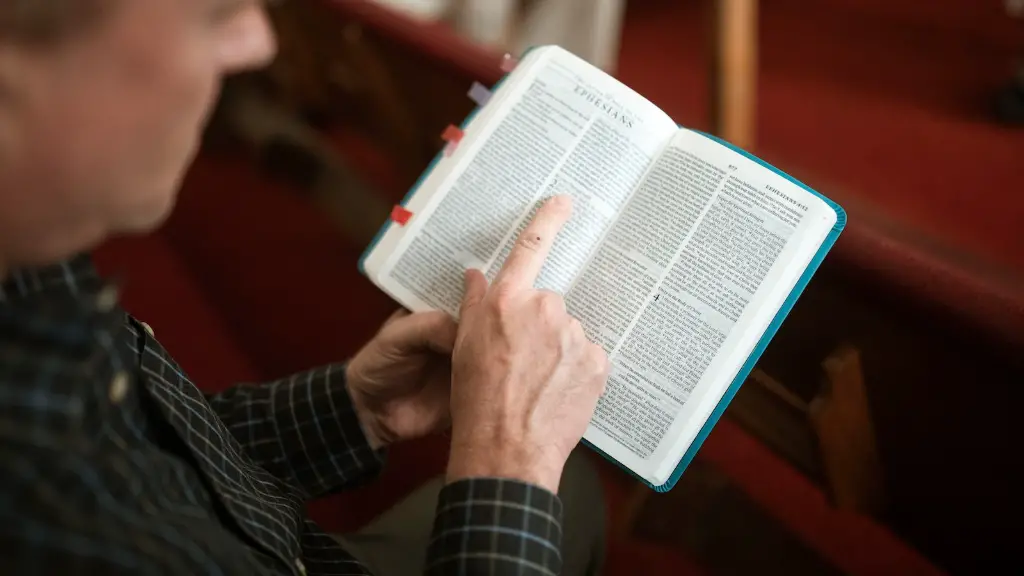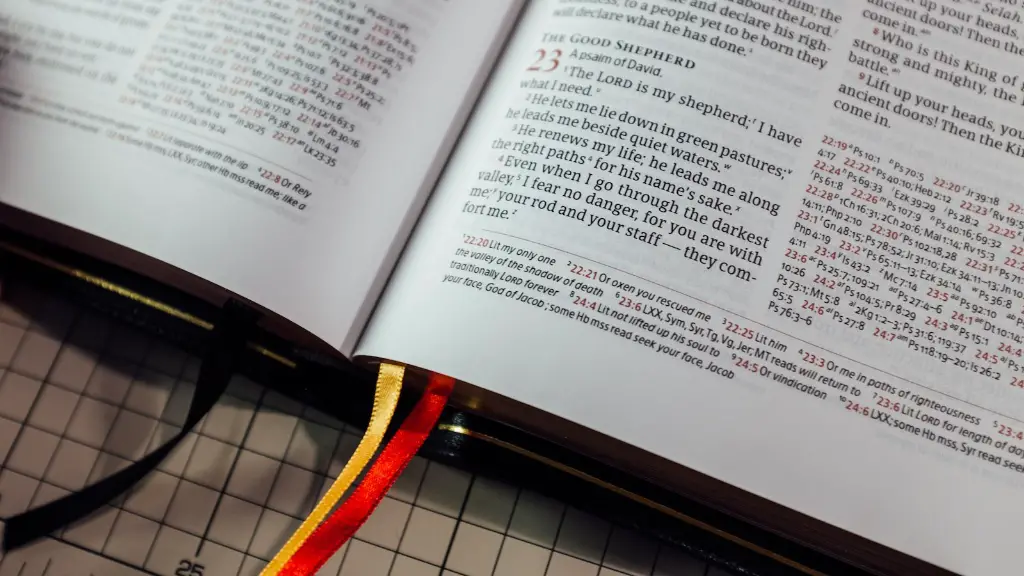The Bible does not explicitly forbid cremation, but it does have a preference for burial. In the Old Testament, cremation was often seen as the practice of pagans and was therefore discouraged. In the New Testament, there are a few verses that mention the burial of Christians. For example, in the book of Acts, we read about the burial of Stephen, who was stoned to death for his beliefs (Acts 7:59). In the book of Corinthians, Paul talks about the fact that we will be raised from the dead, “ whether we are alive or die, we belong to the Lord” (Corinthians 5:14-15). This shows that Paul believed in the resurrection of the body, which would not be possible if we were cremated.
The Bible does not explicitly say anything about cremation, so there is no definitive answer. Some people interpret verses about the body being a temple of the Holy Spirit (1 Corinthians 6:19-20) to mean that the body should be treated with respect after death and cremation is not an appropriate way to do that. Others believe that since God is capable of resurrecting a dead body, He is also capable of resurrecting a body that has been cremated. Ultimately, it is up to each individual to decide what to do with their own body after death.
Can you go to heaven if you are cremated?
From a Christian perspective, there is no need to worry about cremation preventing one from going to Heaven. God can restore life from ashes, just as He can create life from dust.
The Roman Catholic Church has a long history of banning cremation, seeing it as a sacrilegious act against Christians and God. This ban was based on the belief that cremation would prevent the resurrection of the body, and was seen as a physical declaration of disbelief in this doctrine. However, in recent years the Church has begun to reconsider its position on cremation, and now allows it under certain circumstances.
What does the Bible say about being cremated after death
Josiah took the bones out of the tomb and burned them on the altar, which was considered defiling the altar. However, nowhere in the Old Testament does the Bible command that the dead cannot be cremated, nor are there any judgments attached to those that have been cremated.
Cremation is first mentioned in the Bible in 1 Samuel 31: 11-13. In this passage, Saul and his sons are burned and then their bones are buried. This act is likely due to the terrible ravages that were inflicted on their bodies.
What happen to the soul after cremation?
After cremation, the ashes are laid in the Ganges, or one of India’s other sacred rivers, bringing a complete end to the physical body, as well as symbolizing the soul being transported to an auspicious next life. This is a practice that has been followed for centuries in India, and it is considered to be a very sacred and significant ritual.
Islam is strongly opposed to cremation and considers it to be an unclean practice. This is in contrast to Judaism and Christianity, which have more diversity of opinion on the matter.
Should Christians be buried or cremated?
Cremation is an increasingly popular choice for Christians in the United States. According to a Pew Research Center survey, about one-quarter of American adults say they would choose cremation for themselves when they die.1 Many Christians choose cremation as an alternative to burial, while still retaining those aspects of their traditional funeral practices that allow them to honor the lives of their loved ones and glorify God.
There is no one answer to the question of whether cremation is acceptable for Christians. In the early church, Christians were divided on the issue, with some opting for cremation and others choosing burial.2 Today, there is no consensus among Christians on the matter.3
Those who choose cremation generally do so for practical reasons, such as the lower cost of cremation compared to burial.4 Other Christians choose cremation because they see it as a more environmentally friendly option.5 Still others believe that cremation offers a way to hasten the resurrection of the body, which is a central tenet of Christian belief.6
Regardless of the reasons behind their choices, Christians who opt for cremation should do so with the understanding that it is not required by the Christian faith.7 Cremation is a personal decision that should be made in
It is a wonderful thing to know that we will be able to have relationships with our spouses and loved ones in heaven. This is a great comfort to many who have lost loved ones and are grieving. While we will not be married in heaven, we will still be able to enjoy close, intimate relationships with those we love. This is something to look forward to as we journey through this life.
Does the Bible say cremated body can’t rise
Cremation is a process of reducing a body to ashes through the use of high temperatures. The Bible neither favors nor forbids the process of cremation. Nevertheless, many Christians believe that their bodies would be ineligible for resurrection if they are cremated. This argument, though, is refuted by others on the basis of the fact that the body still decomposes over time after burial.
The Bible does not explicitly state whether or not cremation is a sin. However, it is not listed as one of the specific instructions for living and dying set forth by God. Therefore, it is safe to say that cremation is not a sin.
Why are people against cremation?
Religions that frown upon cremation believe that the idea of turning a human body into cremation ashes might interfere with God’s ability to resurrect the dead and bring it to heaven. They believe that cremation goes against the natural order of things and is therefore disrespectful to the deceased. For these reasons, many Orthodox Christians, Muslims, and Jews continue to bury their dead according to their traditional customs.
The reason that bones do not burn in fire is because they require a very high temperature to burn. The ‘ash’ that is left behind after a bone has burned is actually calcium phosphate, which is what bones are made of.
Is it a sin to keep ashes at home
There are many factors to consider when deciding what to do with a loved one’s ashes. If you are not religious, or your religion does not ban cremation, then keeping the ashes at home with you is a perfectly acceptable option. Some people find comfort in having their loved one’s ashes close by, while others prefer to scatter the ashes in a place that was special to the deceased. Ultimately, it is up to you to decide what you are comfortable with and what will provide you with the most peace.
It is common for people who are dying to have hallucinations. They may see or hear things that others do not. This is normal and is considered part of the dying experience. The dying person may focus on another world and talk to people or see things that we cannot see.
Why do you have to wait 3 days before cremation?
Different states have different laws regarding how long families have to wait before they can cremate a loved one’s body. These laws are based on the typical amount of time it takes to complete authorizations, like issuing a death certificate. Because the crematorium needs the death certificate before they can cremate the body, this delays the process and is built into the waiting period.
This waiting period can be difficult for families who are eager to move on from the death of a loved one. But it is important to remember that the cremation process is a legal one and must be followed in accordance with the law.
Cremation is the process of burning a body to ashes. The body does not feel pain during cremation because the person is no longer alive. When a person dies, their brain stops sending signals to the body. This means that the person cannot feel pain or any other sensation. In fact, a dead person feels nothing at all.
Final Words
The Bible does not mention cremation specifically. However, there are a few verses that speak to the idea of burning the dead. In Genesis, after the death of Sarah, Abraham sells the cave in which she is buried to the Hittites and instructs his servant to bury her there (Gen. 23:4, 8, 16). In 2 Samuel, we read that King Saul’s body is burnt after his death (2 Sam. 21:12-13). And in Amos, the Lord speaks of eating the flesh of the dead and burning their bones (Amos 6:10).
So while the Bible does not mention cremation specifically, it does not seem to forbids it. Rather, it seems to allow for cremation as long as the remains are properly respected and buried.
There is no definitive answer to this question as the Bible does not specifically mention cremation. However, some Christians believe that cremation is not biblically permissible as it is seen as the destruction of the body, which is seen as a temple of the Holy Spirit. Others believe that cremation is acceptable as it is a matter of personal preference. Ultimately, the decision of whether or not to cremate should be left up to the individual and their family.





